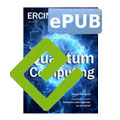Quantum Computation and Information - Introduction to the Special Theme
by Jop Briët (CWI) and Simon Perdrix (CNRS, LORIA)
For more than a century now, we’ve understood that we live in a quantum world. Even though quantum mechanics cannot be ignored during the development of atomic scale components of everyday computers, the computations they perform are governed, like the Turing machine, by the laws of classical Newtonian mechanics. But the most striking and exotic features of quantum mechanics, superposition and entanglement, currently play no part in every-day information processing. This is about to change – and in some specialised applications, already has. In academia, the field of quantum computation has been growing explosively since its inception in the 1980s and the importance of these devices is widely recognised by industry and governments. Big players in the tech industry like IBM and Google frequently announce that they have built yet a larger rudimentary quantum computation device and in 2016 the European Commission launched a one-billion Euro Flagship Initiative on Quantum Technologies.











